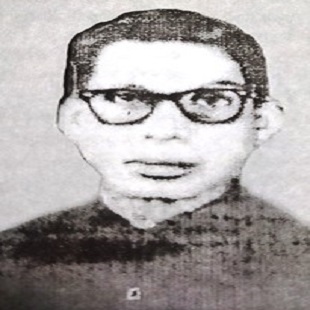
Sreeharsha Mishra was born on 16 June 1917 to Ram Chandra Mishra and Jema Devi in village Chhamunda near Jagannath Prasad of Ganjam district. When he was studying in his village school he lost his father in 1927. As the family had very little income he had to leave school. But after two years he went to Changudisasana of Parlakemindi estate to resume his school education. But he left the school in response to the call given by Mahatma Gandhi to join the Civil Disobedience Movement in 1930at the age of 13. After joining Vanar Sena, he assisted the District Congress Committee of Ganjam to loot the government salt godown at Humma. After this incident police arrested many Congress workers including Sri Harsha. Though the workers were sent to Jail, Sri Harsha was sent to Chengalpet Reformatory jail where he was asked to bow down his head before the photo of Merry and King George V as a mark of respect. But as he refused he was beaten and tortured in many ways. After his release, he came back to his native village and again spread the message of civil obedience in Sorada and Badagad of Ganjam. He was again arrested and sentenced to six months imprisonment in Berhampur jail. Between 1932 and 1934 he was repeatedly arrested for disobeying civil laws and put sometimes in Cuttack and sometimes in Patna camp jail and Rajahmundry jail. In 1934, he helped the flood victim of Cuttack in many ways for which he came into the limelight. In 1935, he joined Allahabad Vidyapith to continue his study.
In 1937, after his return from Allahabad, he joined as Assistant Editor of ‘Asha’ edited by Shashibhusan Rath in Berhampur. During this time he was influenced by the ideology of Netaji Subhas Chandra Bose and joined Forward Block along with Dibakar Pattnaik. He also founded the local branch of the Indian National Army and set up a secret Radio Station at Rambha to communicate with Netaji. He also prepared a blueprint to facilitate his arrival there by air for his march to Delhi. Since Forward Block was a coalition partner of the Ministry in Odisha formed by Krusha Chandra Gajapati, his Ministry was also secretly involved in this plan. When he and Dibakar were set to cross over to Burma to meet Netaji, he was arrested by the British Intelligence Agency in Calcutta. He was released in 1946.
After his release, he became the editor of ‘Samaj’ and subsequently in ‘Kalinga’, ‘Janashakti’, ‘ Prajatantra’, and again in ‘Asha’. He died on 8 April 1984.